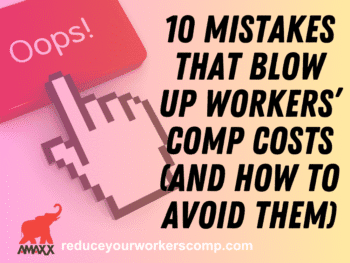We all know it is the employer's responsibility to purchase workers compensation insurance coverage and to report a claim to the claims office when an accident occurs. Unfortunately, in way too many cases this is where the employer's involvement in workers compensation ends. Being passive about workers compensation is an expensive approach to the subject. Here are some six responsibilities and suggestions on how your company can be an active participant in the workers comp claims process. The better the employer meets these responsibilities, the better the employer’s financial picture.
1. A Safe Workers Environment
It is your responsibility as an employer to provide a safe workers environment. By doing so, you eliminate many workers comp claims because the injuries never happen. A strong safety program in which the employees are actively involved in preventing accidents has a major impact on the financial cost of workers compensation. (WCxKitz)
2. Know the Law
Post in a place convenient for all employees the state required notices. This can include their rights under the workers comp laws, a posting of approved medical facilities (in the half of the states allow the employer to select the medical provider), post OSHA posters and anything else required in your state.
If an employee has an injury, allow the employee to seek medical care in a timely manner. Your company does not want to do anything appearing to interfere with the employee's right to medical assistance.
3. Report the Claim Immediately & Accurately
It is not enough just to report the injury claim to the claims office. The injury should be reported to the claims office immediately, not next week, not in a couple of days, but as soon as the employer becomes aware the employee is seeking medical treatment for a workers comp injury. All employees and all their supervisors must know it is a requirement for every workers comp claim to be reported to your workers comp claims coordinator as soon as medical treatment is needed. (WCxKitz)The claims coordinator then promptly completes the Employer's First Report of Injury and immediately transmits it electronically or by fax to the claims office.
All supervisors should be trained on the information needed to complete the Employer's First Report of Injury form so it is accurate when it is received in the claims office. It is well established in the claims field fast and accurate reporting of the claim has a positive impact on the outcome of the claim.
4. Cooperation with the Insurance Company
The employer who takes the hands-off approach to workers comp claims may expect to see a steady increase in the workers comp insurance premiums. The smart employer takes a very active approach to be involved in the workers comp claims process.
It is your responsibilities as an employer to assist the workers comp adjuster in the handling of the claim. As the adjuster investigates the claim, there will be a need for documentation from you as to the employee's payroll history. The adjuster may need to speak with the employee's supervisor or co-workers who may have witnessed the injury. In some situations the adjuster may need to see the employees personnel file or health benefits file. If you are contacted by an attorney for the employee, be sure to notify the adjuster immediately. By providing whatever assistance the adjuster needs on a timely basis you can help mitigate the cost of the workers comp claim.
5. Employee Contact
One of the most often over-looked responsibilities of the employer in workers comp claims is the human element. The employee's supervisor or the workers comp claims coordinator or both of them must stay in contact with the injured employee while he/she is off work. By letting the employee know your company is concerned about his/her well-being and by keeping the lines of communication open, the risk of the claim becoming adversarial or the employee employing an attorney, guaranteed to delay resolution of the claim, is diminished. (WCxKitz)
6. Return to Workers Program
Study after study shows the quicker the employee is returned to work, the lower the overall cost of the workers compensation claim. It is imperative the employer have a Modified Duty Program or a Light Duty Program available for all injured employees.
In most states you can contact the employee's medical provider and ask for the conditions under which the employee can return to work. You have the right to know the employee's medical condition and to have the worker return to work on a light duty program with the medical provider's agreement.
By getting the employee back to work in a modified duty program, the employee benefits and the employer saves money. (Remember the more the insurance company pays out, the higher your eventual workers comp premium becomes). When the employee is off work, the insurance company is paying benefits to the employee, but the employer is not receiving anything of value. When the employee returns to work, the benefits being paid by the insurance company stop. While an employee on modified duty may not be as productive as an employee on regular duty, the employee is still producing some benefit to the employer.
Summary
The more pro-active the employer is in the workers comp claim process, the lower the overall cost of workers compensation. The employer who provides a safe workers environment, knows the requirements of the workers comp laws in their state and who reports their workers comp claims quickly and accurately will lower their cost for workers comp coverage. The employer who cooperates with the insurance adjuster's investigation, keeps in contact with the employee and assists the employee in returning to work quickly has a positive effect on their workers comp costs.
Author Rebecca Shafer, Attorney / Consultant, Amaxx Risks Solutions, Inc. has worked successfully for 20 years with many industries to reduce Workers’ Compensation costs, including airlines, healthcare, printing/publishing, pharmaceuticals, retail, hospitality and manufacturing. Contact: Info@ReduceYourWorkersComp.com or 860-553-6604.
FREE WC IQ Test: http://www.workerscompkit.com/intro/
WC Books: http://www.LowerWC.com/workers-comp-books-manuals.php
WC Calculator: http://www.LowerWC.com/calculator.php
TD Calculator: http://www.LowerWC.com/transitional-duty-cost-calculator.php
Do not use this information without independent verification. All state laws vary. You should consult with your insurance broker or agent about workers' comp issues.
©2010 Amaxx Risk Solutions, Inc. All rights reserved under International Copyright Law. If you would like permission to reprint this material, contact Info@WorkersCompKit.com
























